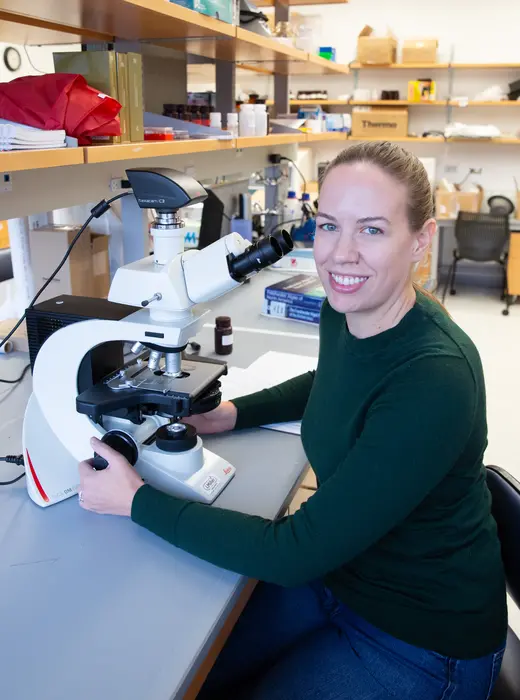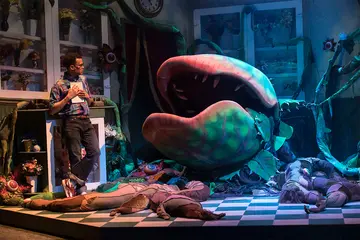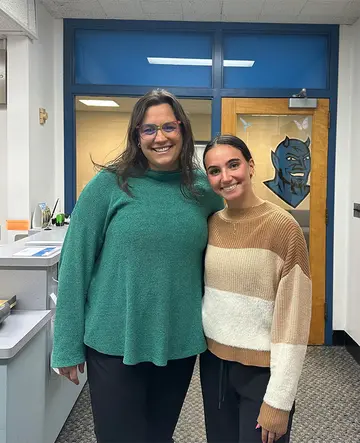Brown Bag speaker to examine harmful algal blooms

Dr. Allison Hrycik
Harmful algal blooms – how they’re formed and ultimately impact human, pet and wildlife health – will be explored by Visiting Assistant Professor Allison Hrycik at the next Brown Bag talk to be held on Wednesday, Dec. 6, beginning at noon.
Brown Bag talks, whose 2023-2024 theme is “Gradually then Suddenly: Understanding Change,” are presented by the College of Liberal Arts and Sciences. The events are free, open to the public and held on first Wednesday of each month in Williams Center Room S204.
In her presentation, “Slow then Sudden Changes: Understanding the Conditions that Lead to Harmful Algal Blooms," Dr. Hrycik will discuss the slow buildup of events that lead to algal blooms, including changes in water temperature, nutrients, water circulation and weather patterns. Identifying harmful blooms and differentiating them from other types of algae will also be addressed.
Unfortunately, we have several lakes in the area that have harmful algal blooms, such as Chautauqua Lake and some parts of Lake Erie. Continuing research helps us learn how to predict these blooms and ultimately, how to better prevent them from happening.” - Dr. Allison Hrycik
Locations that Hrycik will identify in her talk include Chautauqua Lake, which experiences frequent harmful algal blooms throughout the summer and fall, and Lake George and Skaneateles Lake, which have small, infrequent blooms.
Harmful algal blooms (HABs) have become a widely discussed topic as scientists begin to understand their impacts on the environment. Algae growth is a normal and necessary part of a functioning lake ecosystem, but issues are raised when conditions lead to an overgrowth of toxic algae, better known as harmful algal bloom, Hrycik explained.
“Unfortunately, we have several lakes in the area that have harmful algal blooms, such as Chautauqua Lake and some parts of Lake Erie. Continuing research helps us learn how to predict these blooms and ultimately, how to better prevent them from happening,” said Hrycik, whose HABs research has grown to include sampling efforts in Chautauqua Lake.
Hrycik began researching HABs in 2014, when tap water was found to contain toxins due to HABs in Lake Erie. She was enrolled in a master’s program at the time. Hrycik then studied HABs more intently when pursuing her Ph.D.
Hrycik, who joined the Department of Biology in January 2023, works for Rensselaer Polytechnic Institute (RPI) and the Jefferson Project, a collaboration between RPI and IBM Research that seeks to understand human impacts on lake ecosystems. On campus, she is collaborating with Associate Professor Courtney Wigdahl-Perry, an aquatic biologist whose research includes lake ecology, water quality, and harmful algal blooms, and her students, and looks forward to building more formal collaborations.
Dr. Wigdahl-Perry will provide opening remarks before Hrycik begins her presentation.
Prior to her SUNY Fredonia appointment, Hrycik was a research scientist at another university, working on benthic invertebrate and water quality monitoring in the Great Lakes.
Hrycik has a Ph.D. in Biology from the University of Vermont, an M.S. in Fisheries and Aquatic Sciences from Purdue University, and a B.S. in Natural Resources, with distinction in research, from Cornell University.
Current projects of Hrycik include monitoring lake bottom algae, understanding nutrient inputs from the Chautauqua Lake watershed and working with colleagues on Lake George and Chautauqua Lake to understand the different drivers of algae blooms in different lake types.
Brown Bag talks are supported by the Carnahan Jackson Fund for the Humanities of the Fredonia College Foundation. Food and refreshments are furnished by the Faculty Student Association.



